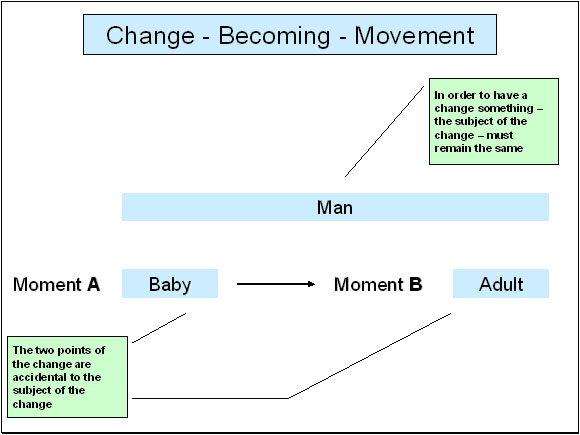| |
from
F. Di Blasi, “Person or Digital Self? An Argument against
AI Theories”
Naturalistic
Period and the Concept of Becoming
Fulvio Di Blasi
Philosophy was
born in Greece as philosophy of nature when some brilliant
thinkers of the seventh century before Christ began to search
for a principle of intelligible unity in the variety of physical
phenomena. These thinkers realized that no change, or becoming,
could ever happen without the simultaneous presence of something
that does not change and become. It was a logical insight:
if something moves from position A to position B—or from moment
A to moment B; or from situation A to situation B—that something,
as the subject of the movement, should necessarily be the
same thing in both positions A and B; and the movement
should be accidental to it. Every movement, in other words,
is always predicated of the same subject.
Slide

If we want to
logically talk about “change” in case of substantial movement,
for example the death of a man, we have to predicate “change”
either of the soul (which from existing with the body begins
to exist separately) or of the matter (which used to compose
the body and now is decomposing into something else).
The concept opposite to “change” is “creation.” In case of
creation there are indeed different subjects in the two moments
A and B; but, in point of fact, talking now about two different
moments is logically incorrect because two moments must necessarily
belong to the same unity. It is for this reason that Thomas
Aquinas vigorously stated that creation is not a movement,
because there is absolutely nothing before creation: nothing
that can change, nothing that can remain the same, nothing
that can pass from moment A to moment B.
[1]
By observing movements in a natural world in which it seems
that every-thing can change into every-thing else, pre-Socratic
philosophers began to wonder about the first subject of those
movements, or, that is the same, about their substratum or
cause: They started to look for the principle of unity that,
by always remaining the same, makes all changes possible.
Their insights soon moved forward, from the idea of a simple
material principle to a principle that is also efficient,
formal and final. In fact, the efficient cause too must transcend
the single movement, as the efficient cause is the cause that
leads A to B, and that consequently can be limited to neither.
The form, or nature, must transcend each movement as well;
otherwise there would be no proportion between A and B, and
everything could become everything else without continuity:
from the human baby to the adult horse, etc. The same transcendence,
finally, must hold for the end, understood as the conclusion
of the movement determined by—or already inscribed in—the
form of the subject: so, ‘being adult’ must be already present
in the baby’s nature as the termination of the movement.
[2]
The insight on the existence of an intelligible unity behind
the diversity and plurality of changes was certainly easier
in the case of purely physical phenomena than of human phenomena,
in which freedom comes into play. In a sense, it was normal
for philosophy to start as philosophy of nature. For moral
philosophy to start, we had to wait until Socrates, in the
fifth century before Christ.
[3]
|
|
